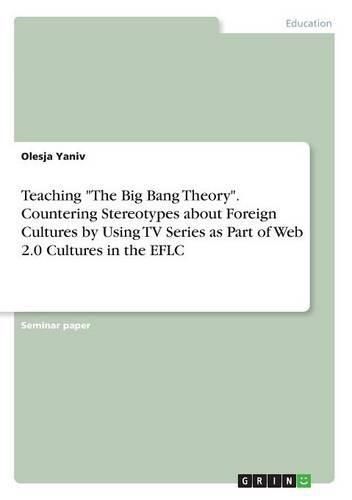Readings Newsletter
Become a Readings Member to make your shopping experience even easier.
Sign in or sign up for free!
You’re not far away from qualifying for FREE standard shipping within Australia
You’ve qualified for FREE standard shipping within Australia
The cart is loading…






Seminar paper from the year 2016 in the subject English - Pedagogy, Didactics, Literature Studies, grade: 1,3, course: Teaching English as a Foreign Language, language: English, abstract: The television and internet, which enables permanent access to television shows, are two of the most popular media of our millennium and, thus, play a significant part in peoples private life as well as in the occupational area. Thus, a transition of industrial society into an information society has been fulfilled since the end of the 1960s and includes a digitalized and interconnected world for the greatest extend. Those changes affect the whole everyday reality; an increasing number of all ages spend their time in front of monitors inside a virtual reality. The kind of learning has changed as well. For the young generation - the so called digital natives - the constant networking and opportunity of gaining knowledge easily became obvious. The digital learners should not consume rehashed knowledge anymore but need to be able to have the ability to use available knowledge and information, screen those usefully and thus, reach efficient learning outcomes. Hence, media literacy becomes a key qualification to participate in the information society. The combination of both, the television as a part of our lives and new digital learning, enables absorption and participation in foreign cultures, values and perceptions by the digital learners. Especially American lifestyle is influencing us in our everyday life. We see films and series from America and we use American products; but students are not always aware of how they adapt to the American lifestyle through watching American films or series. The Big Bang Theory is a good example of how the Americans and foreigners who live in America present themselves and how we get prejudices against other cultures with different cultural background which are presented in episodes of the series. In the course of lifelong learning and c
$9.00 standard shipping within Australia
FREE standard shipping within Australia for orders over $100.00
Express & International shipping calculated at checkout
Seminar paper from the year 2016 in the subject English - Pedagogy, Didactics, Literature Studies, grade: 1,3, course: Teaching English as a Foreign Language, language: English, abstract: The television and internet, which enables permanent access to television shows, are two of the most popular media of our millennium and, thus, play a significant part in peoples private life as well as in the occupational area. Thus, a transition of industrial society into an information society has been fulfilled since the end of the 1960s and includes a digitalized and interconnected world for the greatest extend. Those changes affect the whole everyday reality; an increasing number of all ages spend their time in front of monitors inside a virtual reality. The kind of learning has changed as well. For the young generation - the so called digital natives - the constant networking and opportunity of gaining knowledge easily became obvious. The digital learners should not consume rehashed knowledge anymore but need to be able to have the ability to use available knowledge and information, screen those usefully and thus, reach efficient learning outcomes. Hence, media literacy becomes a key qualification to participate in the information society. The combination of both, the television as a part of our lives and new digital learning, enables absorption and participation in foreign cultures, values and perceptions by the digital learners. Especially American lifestyle is influencing us in our everyday life. We see films and series from America and we use American products; but students are not always aware of how they adapt to the American lifestyle through watching American films or series. The Big Bang Theory is a good example of how the Americans and foreigners who live in America present themselves and how we get prejudices against other cultures with different cultural background which are presented in episodes of the series. In the course of lifelong learning and c